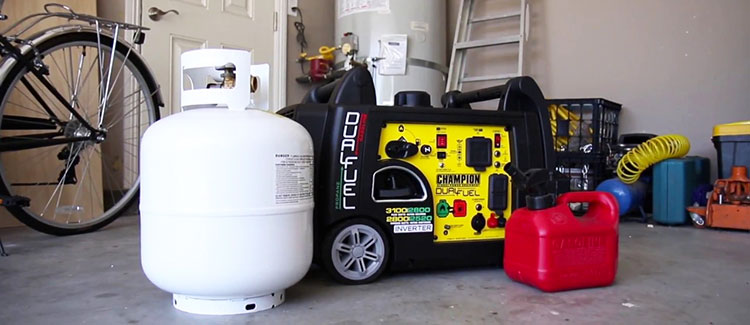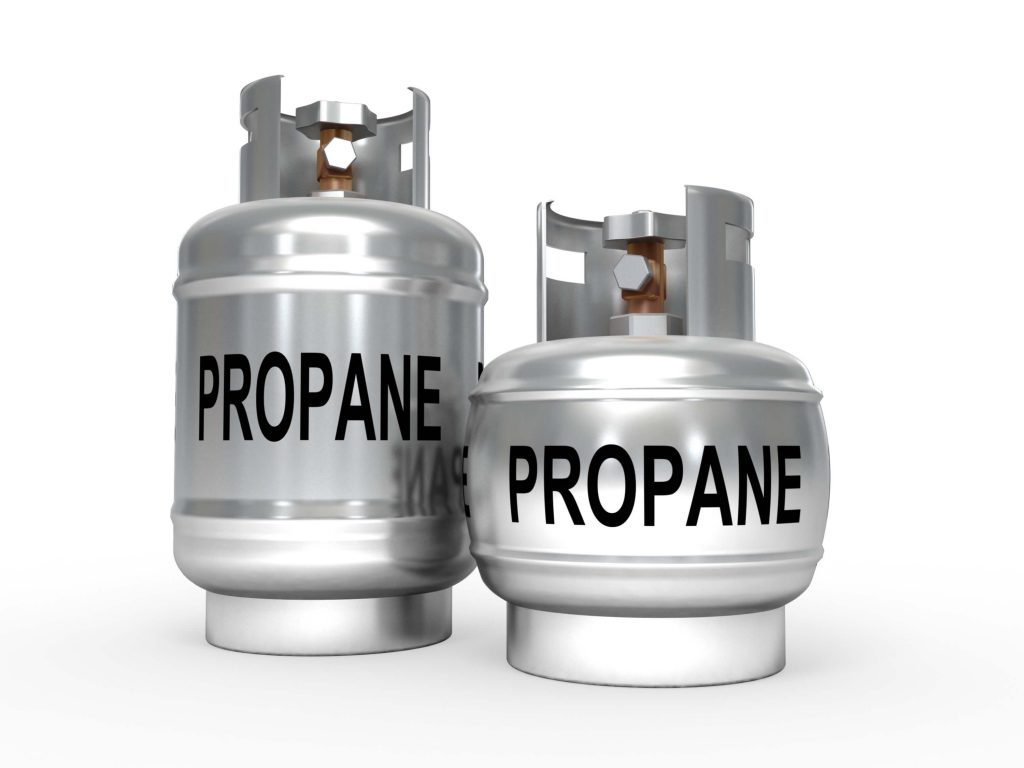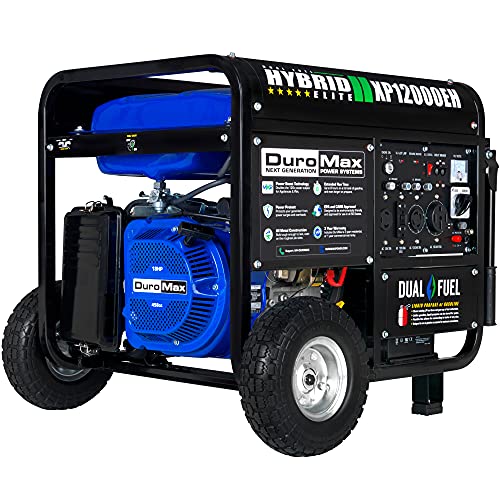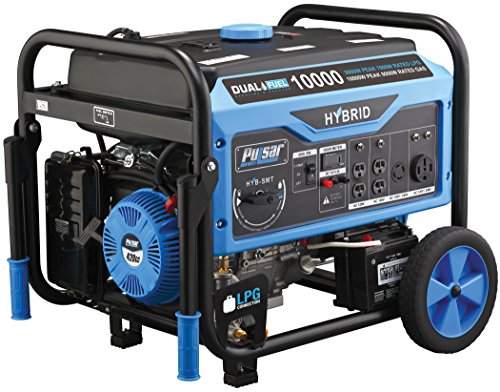Disclosure: This post may contain affiliate links. This means that at no cost to you, we may earn a small commission for qualifying purchases.
Last Updated on April 6, 2024
Portable generators have certainly proven their worth in recent years. Portable generators are used to power all sorts of things, from as small as phones and games, to as a large as construction sites and homes. This innovative technology has really allowed us to do great things.
When it comes to generators as alternative energy products, many people prefer to use a propane generator as opposed to gas. While gas is usually more efficient, propane is more environmentally friendly.
Quick Comparison
If you don’t have time to see the full article, check out our favorite products below.
Finding the best propane generator can be difficult. It’s important to keep our air clean and our forests thriving, so we’re going to dedicate some time into helping you find the best propane generator for your needs.
See Also : The Best Dual Fuel Generators
Contents
The Best Propane Generator Reviews
1. DuroMax XP12000EH Dual Fuel Propane Inverter Generator
With a powerful and reliable DuroMax engine and dual-fuel technology, you can’t go wrong with our number one pick for propane alternative energy products. We feel this inverter generator is one of the best propane generators in the market today.
Plug in just about anything you can think of to the two 120V 20A power outlets, 1 120V 30A twist lock outlet, 1 120/240V twist-lock outlet, and the 1 120/240V 50A Heavy Duty AC Outlet. Provides clean power for sensitive electronics.
This machinery is built to last, runs well on propane, and delivers high levels of electricity where ever and whenever you need it.
Specifications
- 12,000 starting watts, 9,500 running watts
- 18HP, 457cc OHV engine
- 120 20A /120V 30A
- EPA/CARB approved
- Electric start
- 260 pounds
- 74dB sound rating
- Running time: 7.5 hours
It’s no wonder this machine claims the nickname “Beast,” considering all the features and power it has on its side. The DuroMax XP12000EH boasts 12,000 watts of starting power, giving you the ability to handle any electricity issue, big or small. It packs the punch of a sedentary unit with the mobility of a portable one. You can expect 6.78 hours of run time with the 1.19 gallon fuel tank filled while a 20 pound propane tank will net you over 21 hours of use
This heavy-duty piece of equipment may sound complex, but it displays a user-friendly control panel featuring a push-button start and the optional recoil start. With 5 different outlets including DC and AC, you won’t have trouble hooking anything up in a storm, camping, or on the job site.
Made with a heavy-duty metal frame with full-isolated motor mounts, this DuroMax model is built to last. Though it may be large and in charge, the noise level is low which makes this machine much quieter than its competitors so you can enjoy your activities in peace.
Easy to transport and built with quality material, you can’t go wrong with the Beast.
PROS
- Heavy-duty, durable materials
- Noise level is low
- Large amounts of power with several outlets
- Easy transfer switch from gas to propane
- Easy to use
CONS
- Plastic wheels are not durable
- The auto-idle feature does not work with propane
2.Westinghouse WGen3600DF, CARB Compliant.
Electric power meets convenience with the Westinghouse WGen3600DF CARB Compliant portable generator.
With remote start, a heavy-duty frame, and big, sturdy wheels, you can take your Westinghouse anywhere and even start it from afar with its FOB key. We feel this is one of the best propane generators out there, It also comes with a low oil shutdown feature. The addition of never-flat wheels and collapsible handles makes it even easier to move this generator around the campsite.
Specifications
- 4,650 starting watts, 3,600 running watts
- 4-gallon fuel tank( with fuel gauge)
- Electric push-button & remote start
- 212cc Westinghouse 4-stroke OHV engine
- EPA, CARB, CSA compliant
- Running time: 18 hours at 25% capacity
This powerhouse on wheels delivers over 3,000 watts of power all maneuvered by an intuitive control panel that’s super user-friendly and easy to operate. With a push-button start, a remote control start, and 4 different outlets, you’re ready to go as soon as you open the box.
Along with Westinghouse’s reliable and powerful engine, you also get oil, an oil funnel, a tool kit, and an easy to follow user’s manual. Your machine is wrapped nicely in a long-lasting, cast iron engine sleeve designed to keep it safe and operable.
A uniquely designed knob lets you switch from gas to propane in an instant, while the battery indicator lets you know when it’s time to recharge. Compact, portable, and powerful generator you’ll gain some real dependability when you use this Westinghouse.
PROS
- Switch from gas to propane easily and on the go
- Easy push-button start and remote FOB
- Easy to maintain
- Camper and RV ready
- Portable with sturdy wheels
- User-friendly control panel
CONS
- No noise muffler
3. Champion 7500 dual-fuel RV Ready Portable Generator
The Champion Power RV ready inverter generator brand displays great confidence in its statement, “Innovation is at the core of what we do.” This innovation is apparent in their 7500 dual-fuel portable generator, which features an electronic start, a wheel kit, and 7,500 watts of power output. These inverter generators also have a low oil shut-off sensor. It offers up to 10 hours of runtime on propane gas.
When it comes to plugging up your appliances like air conditioner, you can use the 2 120V 20A household plugs, a 120V 30amp (TT-30R) outlet, or the 120V 30amp Locking (L5-30R) outlet. This is perfect for RV use.
Specifications
- 7,500 starting watts, 6,750 running watts
- 439cc Champion engine
- Running time: 9 hours
- 120/240V operations
- GFCI protected outlets
- Comes with a 3 year warranty
- 6-gallon full tank of fuel tank
- 7 pounds.
The Champion 7500 uses technology that allows you to easily and quickly switch from gasoline or propane with the touch of a button. In the same way, the startup is incredibly easy using the same method. Along with your generator, you also get the battery.
Multiple outlets make this device great for emergency backup and everyday use. It has enough power for tools and also if you want to power appliances, and more, and it is very reliable.
The included wheel kit lets you transport this generator with ease, moving the 95 pounds with heavy lifting involved. And, considering the amount of power you can draw from this machine, it is fairly quiet for its size.
PROS
- Electric start for easy use
- A large amount of power and fuel storage
- Fairly quiet during use
- Lighter weight
CONS
- Generator vibrates a lot during use
- Uses a lot of fuel
4. WEN DF1100 Propane Generator
With both gasoline and propane options, anyone can turn this from a gas guzzler to an environmentally friendly machine. With WEN DF11000 dual fuel generator, you get all the power output of an 11,000-watt generator without wasting a drop on unclean fuel. We consider this fuel-efficient generator as one of the best portable propane generators out there.
Specifications
- 11,000 watts starting, 8,300 watts running
- 120/240V
- 457cc, 4-stroke OHV engine
- Dual-fuel Generator.
- 6 gallons
- Run time: 8.5 hours
- 4 120V outlets, 1 120V outlets, 1 120/240V outlet, 1 12V DC outlet
A highly reliable and versatile generator, the WEN DF11000 has proven its use through its dual-fuel engine, easy electric start, and high wattage. With this machine, you can power anything from emergency situations to luxury camping trips.
With a simple Fuel selector dial, you can switch from gasoline to propane – WEN makes it easy. At the same time, you can use the push-button electric start for quick startup rather than messing with a ripcord.
The 6.6-gallon propane tank holds plenty of fuel – enough run time for over 8 hours at 50% capacity. Several outlets (7, to be exact) give you plenty of space to plug in all the essentials.
Safety is key when it comes to WEN’s products, so they have done us a favor by including the automatic voltage regulator and overload protection. These features keep your product from overheating and taking on too much at once, which also makes it safer for you and your family to use.
With big, sturdy wheels and convenient handles, you can wheel this generator anywhere that you need it to be. Track your usage with the digital hour counter as well, so you can time your refills accurately and make the most of your fuel.
PROS
- A large amount of power with big fuel propane tank
- Automatic voltage regulator and overload protection for safety
- The instant electronic start button is fast and easy
- Sturdy wheels, which becomes easy to transport
- Has an easy gas to propane switch
- The heavy metal frame is very durable
CONS
- Weighs heavy
5. Pulsar PG10000B16
This Pulsar model delivers tons of power with its 10,000-watt rating. Its large fuel tank and easy operation makes sourcing your alternative energy product simple and convenient. This generator offers a switch and go technology.
Specifications
- 10,000-watt starting watts, 8,000 running watts
- 420cc, 4-stroke, OHV air-cooled engine
- 6-gallon fuel propane tank
- Run time: 12 hours
- Push start/recoil backup
- 4 120V AC outlets, 1 50Amp RV ready outlet, 1 120/240V outlet, 1 12V DC power output
Tons of features and the upmost reliability elevate the Pulsar PG1000B16 to the top of the list when it comes to propane generators. Though it runs on gasoline, the dual-fuel switch lets you easily switch to propane, even while the machine is running.
6.6 gallons of fuel gives you up to 12 hours of continuous operation at 50% capacity. With the electronic push-button start, yanking and pulling simply is not needed. However, there is a recoil to be used as a backup to the electronic start – just in case.
Several outlets let you connect multiple devices at once so you can use tools, lights, chargers, and more. Keep track of your levels with the 3-in-1 digital meter. This indicator displays low oil and fuel and implements an automatic shutdown when they reach a certain point.
This model also comes in 5,250, 7,750, and 12,000 watts to suit your various electronic generator needs.
PROS
- Seamless switch from gas to propane before or during use
- Includes wheels and drop-down handles for transportation and storage
- 7 different outlets for various external use
- Includes a propane hose to quick hookup
- Long run time and large fuel tank
CONS
- Heavy and difficult to lift
- There have been minor issues with start-up button
Propane Generators – What You Should Know

Education is a fine tool to have in your back pocket. That’s why we’ve provided you with some additional information about generators and the use of propane to make sure you know everything you need to before making a purchase.
Read through some of this information on generators to learn more as you make your way through the buying process.
What is a Generator and How Does it Work?
Generators are devices that are used to converts motive power, or mechanical energy, into useful electrical power. Users can take this generated electrical power and apply it to external applications, such as tools, appliances, or devices.
Generators come in many different forms and use various sources of energy. Some of those sources are steam, gas, wind, water, and hand cranks. Although there are many ways to power a portable generator, gas is the most common method used today.
Some components of generators are dynamos, which generate direct currents, alternators, which generate the alternating current, rotors, and stators. Generators will also use copper wires to transfer the electrical current that has been created into anything you plug into the machine.
With many sizes and power levers, you can use generators for a myriad of electrical objects – even things as large as an entire building or city. Of course, you should only buy what you need, as these alternative energy products are not cheap.
What Can You Use a Generator For?
Generators have many uses. Depending on your experience level in the area, your mind may first go to emergency situations, or it could jump to backup generators for buildings. Both of these would be correct, but they are certainly not all-inclusive answers.
The larger the generator, the more you can power. That being said, that largest of generators are used to power whole cities if necessary. Coming down from that, other large generators are used as backup electricity supplies for office buildings, dorm rooms, hotels, grocery stores, and even personal homes.
During storms or other sources of power outages, large generators can be used to carry on operations, even if the rest of the area is in the dark.
Perhaps the most common reasons for buying a portable generator are the two following: camping and emergency use.
Generators are great for camping, either with an RV or in a tent. The smaller generators are much more portable, allowing you to take it to a campground or transport it in your camper. They are strong enough to power chargers, radios, TV, and other small appliances.
Many people buy generators for the purpose of having a backup supply of energy in case of emergencies. In areas where storms are prevalent, and outages are common, it’s always wise to have something strong enough to power the necessities.
Quality generators can power things like your lights, cooling and heating, the refrigerator, and your internet services. In disaster situations where it may be days before you get your power back, a portable generator can definitely be of good use. Even in less serious situations, it’s a nice comfort to be able to turn your lights on and keep the fridge running.
Gasoline vs. Propane Generators
There are advantages and disadvantages to both gasoline and propane, which makes sense considering they are both still widely used. The ultimate choice is up to you, but knowing a little more about both can help you make a more informed decision.
Also, many people have propane tanks hooked up to their gas grills that can be used as a backup power source on hybrid generators.
Gas is very common because it is the most accessible fuel. Gas stations are everywhere and clearly marked, so it’s easy to find and stock up on. However, it is also everyone’s go-to in an emergency situation, which means if you don’t have any on hand, it may be difficult to get ahold of.
That being said, you can’t really stock up on gas too much because it’s highly flammable and dangerous to keep lying around. It also degrades after about just one year, so you can’t get a lot and keep it for a long period of time.
Gasoline tends to be on the more expensive side, and we all know how much the gas prices fluctuate. It’s also toxic and pollutes the air. You shouldn’t breathe gas in, but being near it with your home portable generator can make that difficult.
Propane has certainly grown in popularity when it comes to generators. Propane comes in practically spill-proof cylinders and evaporates if spilled. It’s much better for the environment, as it is a clean-burning fuel source.
A huge positive for propane is that it costs much less than gasoline does. Not only that, but you can store propane basically forever as opposed to gasoline’s one-year shelf life. This makes it much easier to stock up and be prepared for an incident.
On the flip side, propane generators have the potential to produce more technical problems and system failures. This is because the systems required to run on propane are much more complex. This also makes it harder to fix any problems that may occur.
In addition, propane is not as efficient as gasoline and also becomes obsolete in extremely cold weather.
The good news is that many propane generators allow you to use both gasoline and propane as power sources with an easy way to switch from one to the other. So, in a way, you don’t really have to choose.
What To Look Out For In A Propane Generator

Your buying process will be made a lot easier once you know what you’re looking for. Take a look at this list of features and their brief explanations to get a better idea of what your portable generator should have.
Starter
Generators come with two different methods of startup: electric and recoil. Recoil startups feature a rip chord similar to that of a chainsaw or even a lawnmower. Electric start requires much less effort.
You simply push a button or flip a switch to get your portable generator going. Even more, high-tech models have remote starts using FOBs like the ones that come on your car keys.
Neither of these options is better than the other per se, as they both work. However, electric starts are simply easier and take less effort. In addition, many electric starts will come with a recoil anyway as a backup, should something happen to the electric start.
Portability and Wheels
Portability is always something to consider when buying a portable generator. Consider how much you plan on moving your machine.
For example, if you plan on taking a generator to the campsite where you’ll be moving around a lot, you shouldn’t get yourself a 300-pound, 11,000-watt portable generator.
Many smaller generators come in weighing at under 50 pounds, which is a much better choice for things like emergencies, camping, tailgating, and any other outdoor event.
You can also find generators with wheels and handles for easy transportation. Wheels make all the difference on even heavier generators, so make sure you get a model with those features.
Gauges
There’s nothing more frustrating than running out of gas simply because you didn’t know it needed to be refilled. Believe it or not, there are generators that come with gauges for your fuel and your oil. Your best bet is to get a machine that has some sort of indicator.
Some generators will show you the actual levels, while others have a light that turns on when you’re starting to run low. Still more use an auto-shutoff feature that stops your generator once the oil or the gas reaches a certain level. This keeps you safe and prevents damage to your machine.
Whichever function you prefer, make sure you have something to let you know when your levels are low. You never want to be in an emergency situation without fuels, and running on empty can ruin your generator.
Wattage
The best way to determine the wattage you should get is to nail down what you intend to use your generators for. It’s no secret that the more power you’re planning on using, the more wattage you will need.
To give you a general idea, many people using their generators for camping, tailgates, and emergencies will get anywhere from 2,000 to 6,500 watts. You can also get higher wattages, but it will be more expensive and is usually not necessary. If you’re someone who likes to power both necessities and luxuries during a power outage, you’ll want a higher wattage.
Larger wattages, like 11,000 and up, are good for construction sites and powering buildings. Backup generators are never any lower than 11,000 and are usually higher.
Final Thoughts
Your generator will become your best friend when you find you need it most. Whether it’s an emergency power outage during a large storm or a convenient luxury during a camping trip, the additional power can always go to good use.
If you’re new to the world of electrical generators, don’t worry. We have listed a few great propane-compatible systems that have only the highest ratings and quality materials. We have also equipped you with lots of information to help you along in your buying process.
While there’s nothing wrong with using natural gas, propane does have many advantages that you may want to consider. It’s cheaper, it has a much longer shelf life, and it’s readily available during power outages. Think about the information we’ve given you to make the best buying decision.







